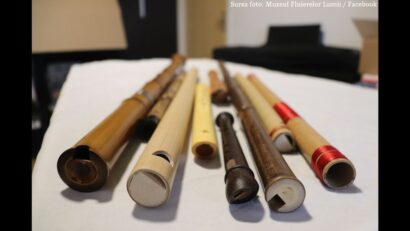19th century female merchants
The Romanian Principalities saw a boost in trade in the first part of the 19th century.

Christine Leșcu, 25.03.2017, 14:09
The first half
of the 19th century brought a strengthening of trade between the
Romanian Principalities and their neighbours, as well as an increase in the
number of merchants. In part, this was owing to a shift in the focus of trade
in Moldavia and Wallachia from the Ottoman Empire to other countries.
Obviously, an overwhelming majority of the merchants of that time were men,
given that the role of women had long been confined to running the home and
bringing up children. However, there
have been women who, under certain circumstances, took over and successfully
managed their husbands’ businesses. Nicoleta Roman, a historian with the
Nicolae Iorga History Institute, has researched the topic and has come to some
conclusions:
Women were not
at the forefront of economic life, nor could they be in what was entirely ‘a
men’s world’. However, we have examples of women purchasing, selling or
entering trade partnerships on their own behalf or in their husbands’ name. The
husband would give her the authority to represent him in transactions with his
partners. But in order to get to this position, the wife had to have been
involved in the family business to such an extent that she would be familiar
with the rhetoric of negotiations and would be able to keep the books. Coming
from a merchant family was a strength, in that it would help her learn more
quickly and put her experience to use.
There were three
kinds of situations when, in the late 18th and early 19th
Century, women would run trade businesses. They did that partly and
temporarily, when their husbands were engaged in long-distance trade and were
away from home. Secondly, they were fully in charge with a business during
wartime, when their husbands were enrolled, and this was also a temporary
position. And thirdly, women would completely and indefinitely take over a
business when widowed. In all these situations, the respective women had long
been familiar with the enterprise and, more importantly, they were already
accepted by the other traders as business partners, which could only be based
on extensive experience. And this proves that in many cases, traders’ wives
were significantly involved in the family business, even if not acknowledged as
such.
Of the few women
who paved their way into that world in the first half of the 19th
Century, one of the best known was widow Safta Castrisiu. Nicoleta Roman told
us her story:
She was the wife of the Macedo-Romanian
merchant Gheorghe Castrisiu, who came to Romania from Greece and opened a small
shop in Bucharest. Soon, he proved his talent as a merchant and expanded his
business to Sibiu and even Vienna. He imported from the West textiles, coffee,
muslin, leather products and golden cigar cases encrusted with diamonds. There
is no information about his family until 1810, and from that moment on
correspondence with other merchants ceased. Nevertheless, information about his
widow, Safta, started appearing, as she took over the family business and
started focusing on Bucharest and the rest of Wallachia. In 1826 she bought
small shops inside Zamfir’s Inn. At the same time, she had her own inn in
Bucharest, on Mogosoaia Bridge, which became known as the Castrisoaia’s Inn.
Also, she owned several small shops in the Izvor neighbourhood, on the bank of
Dambovita River. One of them even had a terrace, which was apparently one of
the meeting places of the 1848 revolutionaries. Along with taking over the
family business, Safta became the head of the family. Just like many of the
merchant families of that time, Safta and her husband had planned to establish
a genuine commercial dynasty. Unfortunately, her son, Dimitrie, died young, at
the age of only 31.
Her son’s death may have triggered her wish
to get involved in philanthropic and social activities. Thus, in 1833, she was
among the donors of the first Romanian Theatre, and in 1846 she built a school
and a church on one of her countryside properties. After her death, in 1862,
her will revealed the influence that Safta, the woman merchant had in the
Bucharest community of that time. A part of her fortune was donated to ensure
the maintenance of some philanthropic institutions, such as the Philanthropy
Hospital in Bucharest and the hospital in Pitesti. Also, some of the money went
to the schools and churches that she had founded, helped a young student attend
the university in Paris and covered the dowry of a young woman.
The destiny of Safta Castrisoaia and not
only hers, is proof of the fact that starting the 19th century, an
increasing number of women became active merchants, but only under certain
circumstances. The main condition was for them to be widows and inherit the
family fortune, so their role was that of a temporary substitute for their
husbands.





























